
The Allman Brothers Band was an American rock band formed in Jacksonville, Florida in 1969 by brothers Duane Allman and Gregg Allman, as well as Dickey Betts, Berry Oakley (bass), Butch Trucks (drums), and Jai Johanny "Jaimoe" Johanson (drums). Subsequently based in Macon, Georgia, they incorporated elements of blues, jazz and country music and their live shows featured jam band-style improvisation and instrumentals.
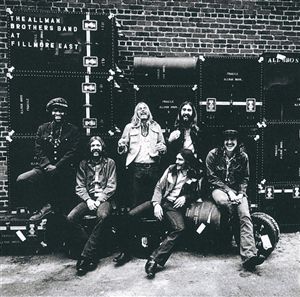
At Fillmore East is the first live album by American rock band the Allman Brothers Band, and their third release overall. Produced by Tom Dowd, the album was released on July 6, 1971, in the United States by Capricorn Records. As the title indicates, the recording took place at the New York City music venue Fillmore East, which was run by concert promoter Bill Graham. It was recorded over the course of three nights in March 1971 and features the band performing extended jam versions of songs such as "Whipping Post", "You Don't Love Me" and "In Memory of Elizabeth Reed". When first commercially released, it was issued as a double LP with just seven songs across four vinyl sides.

Eat a Peach is a 1972 double album by American rock band the Allman Brothers Band, containing a mix of live and studio recordings. Following their artistic and commercial breakthrough with the July 1971 release of the live album At Fillmore East, the Allman Brothers Band got to work on their third studio album. Drug use among the band became an increasing problem, and at least one member underwent rehab for heroin addiction. On October 29, 1971, lead and slide guitarist Duane Allman, group leader and founder, was killed in a motorcycle accident in the band's adopted hometown of Macon, Georgia, making it the final album to feature him.

Gregory LeNoir Allman was an American musician, singer and songwriter. He was known for performing in the Allman Brothers Band. Allman grew up with an interest in rhythm and blues music, and the Allman Brothers Band fused it with rock music, jazz, and country at times. He wrote several of the band's biggest songs, including "Whipping Post", "Melissa", and "Midnight Rider". Allman also had a successful solo career, releasing seven studio albums. He was born and spent much of his childhood in Nashville, Tennessee, before relocating to Daytona Beach, Florida and then Macon, Georgia.
"Little Martha" was the only Allman Brothers Band track written solely by group leader and partial namesake Duane Allman. The song first appeared as the final studio track on the Allman Brothers Band's fourth album, Eat a Peach, released in 1972. The track was recorded in October 1971, a few weeks before Duane Allman's death in a motorcycle accident.

Forrest Richard Betts is an American guitarist, singer, songwriter, and composer best known as a founding member of The Allman Brothers Band.

Warren Haynes is an American musician, singer and songwriter. He is best known for his work as longtime guitarist with the Allman Brothers Band and as founding member of the jam band Gov't Mule. Early in his career he was a guitarist for David Allan Coe and The Dickey Betts Band. Haynes also is known for his associations with the surviving members of the Grateful Dead, including touring with Phil Lesh and Friends and the Dead. In addition, Haynes founded and manages Evil Teen Records.

Brothers and Sisters is the fourth studio album by American rock band The Allman Brothers Band. Co-produced by Johnny Sandlin and the band, the album was released in August 1973 in the United States by Capricorn Records. Following the death of group leader Duane Allman in 1971, the Allman Brothers Band released Eat a Peach (1972), a hybrid studio/live album that became their biggest-selling album to date. Afterwards, the group purchased a farm in Juliette, Georgia, to become a "group hangout". However, bassist Berry Oakley was visibly suffering from the death of Duane, excessively drinking and consuming drugs. In November 1972, after nearly a year of severe depression, Oakley was killed in a motorcycle accident, making it the last album on which he played.

Win, Lose or Draw is the fifth studio album and sixth overall by American rock group the Allman Brothers Band. Produced by Johnny Sandlin and the band themselves, it was released on August 22, 1975 in the United States by Capricorn Records. It was the last studio album to feature bassist Lamar Williams and pianist Chuck Leavell.

"Jessica" is an instrumental piece by American rock band the Allman Brothers Band, released in December 1973 as the second single from the group's fourth studio album, Brothers and Sisters (1973). Written by guitarist Dickey Betts, the song is a tribute to gypsy jazz guitarist Django Reinhardt, in that it was designed to be played using only two fingers on the left hand.
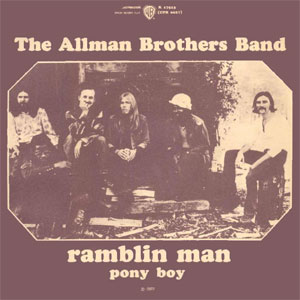
"Ramblin Man" is a song by American rock band The Allman Brothers Band, released in August 1973 as the lead single from the group's fourth studio album, Brothers and Sisters (1973). Written and sung by the band's guitarist, Dickey Betts, it was inspired by a 1951 song of the same name by Hank Williams. It is much more grounded in country music than other Allman Brothers Band compositions, which made the group reluctant to record it. Guitarist Les Dudek provides guitar harmonies, and it was one of bassist Berry Oakley's last contributions to the band.
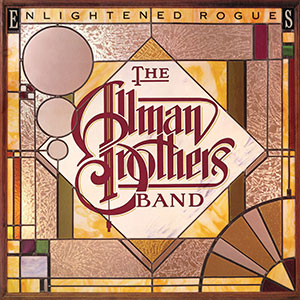
Enlightened Rogues is the sixth studio album by American rock band the Allman Brothers Band. Produced by Tom Dowd, the album was released in February 1979 in the United States by Capricorn Records and PolyGram Records elsewhere. The Allman Brothers Band had broken up in 1976 following internal turmoil, amplified by escalating drug use. The band members splintered into different acts — among those Great Southern, Sea Level, and the Gregg Allman Band. Guitarist Dickey Betts approached his bandmates in 1978 with the prospects of a reunion. After two former members declined to return, they added new members which made it the first to feature guitarist Dan Toler and bassist David Goldflies. Living together in Sarasota, Florida, they rehearsed and wrote the material for their next album in fall 1978.
"In Memory of Elizabeth Reed" is an instrumental composition by the American group The Allman Brothers Band. It first appeared on their second studio album, Idlewild South (1970), released on Capricorn Records. The jazz-influenced piece was written by guitarist Dickey Betts, among his first writing credits for the group. Betts named it after a headstone he saw for Elizabeth Jones Reed Napier in Rose Hill Cemetery in the band's hometown of Macon, Georgia. Multiple versions of the composition have been recorded, with the version performed on the group's 1971 live album At Fillmore East generally considered the definitive rendition.
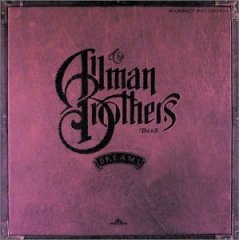
Dreams is a compilation album by the Allman Brothers Band. Packaged as a box set of four CDs or six LPs, it was released on June 20, 1989.
"Blue Sky" is a song by the American rock band The Allman Brothers Band from their third studio album, Eat a Peach (1972), released on Capricorn Records. The song was written and sung by guitarist Dickey Betts, who penned it about his girlfriend, Sandy "Bluesky" Wabegijig. The track is also notable as one of guitarist Duane Allman's final recorded performances with the group. The band's two guitarists, Duane Allman and Dickey Betts, alternate playing the song's lead: Allman's solo beginning 1:07 in, Betts joining in a shared melody line at 2:28, followed by Betts's solo at 2:37. The song is notably more country-inspired than many songs in the band's catalogue.

"Midnight Rider" is a song by the American rock band the Allman Brothers Band. It was the second single from their second studio album, Idlewild South (1970), released on Capricorn Records. The song was primarily written by vocalist Gregg Allman, who first began composing it at a rented cabin outside Macon, Georgia. He enlisted the help of roadie Robert Kim Payne to complete the song's lyrics. He and Payne broke into Capricorn Sound Studios to complete a demo of the song.

"Straight from the Heart" is a song by American rock band the Allman Brothers Band, released in July 1981 as the lead single from the group's eighth studio album, Brothers of the Road (1981). Written by guitarist Dickey Betts and Nashville songwriter Johnny Cobb, the song was a conscious effort to produce a hit single. The Allman Brothers Band had signed to Arista Records in 1980, and founder Clive Davis pushed them to modernize their sound. "Straight from the Heart" was later regarded as an "embarrassing" experiment by members of the band.
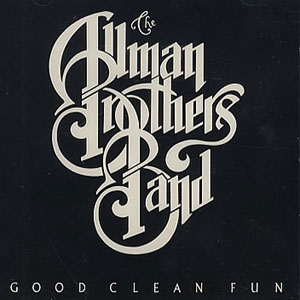
"Good Clean Fun" is a song by American rock band the Allman Brothers Band, released in July 1990 as the lead single from the group's ninth studio album, Seven Turns (1990). Written by guitarist Dickey Betts, vocalist Gregg Allman and songwriter Johnny Neel, the song was the band's first single since their 1982 breakup.

Play All Night: Live at the Beacon Theatre 1992 is a two-CD live album by the Allman Brothers Band. It was recorded at the Beacon Theatre in New York City on March 10 and 11, 1992. It was released on the Epic/Legacy label on February 18, 2014.
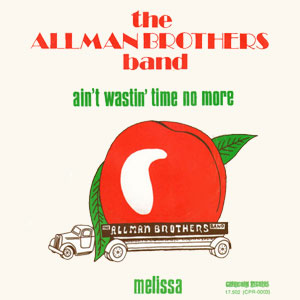
"Ain't Wastin' Time No More" is a song by the American rock band the Allman Brothers Band. It was the lead single from their third studio album, Eat a Peach (1972), released on Capricorn Records. The song, written by Gregg Allman, largely concerns the death of his brother, Duane Allman, who was killed in a motorcycle crash in 1971.

















